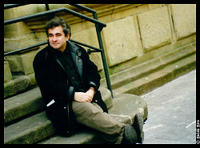
by Bernardo Atxaga (right)
This novel is a unique literary event: a fresh and original voice from the Basque nation, one of the world's most isolated cultures. Already published in all of Europe's main languages, English readers will now see why Obabakoak was a literary sensation throughout Europe.
The title of the book means "events that happenned in Obaba", and Obaba is the village at the centre of this novel composed of linked tales and parodies written with a delicate sense of childlike innocence - as though Borges were writing about ordinary people.
A man relates in his diary the beautiful deception practised on him by his father many years before. A young woman teacher, friendless and lonely, makes a passionate mistake. A boy is transformed into a wild boar. Two friends tell each other stories while trying to solve the mistery of a chilhood photograph: can a lizard slip into your ear and eat your brain, so that memory and creativity are destroyed?
Gradually, we realize that there is a darker theme beneath these jokey and sad stories of loss, of events in a small mysterious land. All the good stories seem already to have been written, and the narrator of the book becomes a victim of his own tales and his "search for the lost word" that will give meaning to them.
PROLOGUE
(The author speaks of his language, euskera)
I write in a strange language. Its verbs,
the structure of its relative clauses,
the words it uses to designate ancient things
- rivers, plants, birds -
have no sisters anywhere on Earth.
A house is etxe, a bee erle, death heriotz.
The sun of the long winters we call eguzki or eki;
the sun of the sweet, rainy springs is also
- as you'd expect - called eguzki or eki
(it's a strange language but not that strange).
Born, they say, in the megalithic age,
it survived, this stubborn language, by withdrawing,
by hiding away like a hedgehog in a place,
which, thanks to the traces it left behind there,
the world named the Basque Country or Euskal Herria.
Yet its isolation could never have been absolute
- cat is katu, pipe is pipa, logic is lojika -
rather, as the prince of detectives would have said,
the hedgehog, my dear Watson, crept out its hiding place
(to visit, above all, Rome and all its progeny).
The language of a tiny nation, so small
you cannot even find it on the map,
it never strolled in the gardens of the Court
or past the marble statues of government buildings;
in four centuries it produced only a hundred books...
the first in 1545; the most important in 1643;
the Calvinist New Testament in 1571;
the complete Catholic Bible around 1860.
Its sleep was long, its bibliography brief
but in the twentieth century the hedgehog awoke.
Obabakoak, this book published now in this city,
the city of Dickens, of Wilkie Collins and of so many others,
is one of the latest books to join the Basque bibliography.
It was written in several houses and in several countries,
and its subject is simply life in general.
And Obaba is just Obaba: a place, a setting;
ko means "of"; a is a determiner; k the plural.
The literal translation: The People or Things of Obaba;
a less literal translation: Stories from Obaba
(and with that I conclude this prologue).
BIOGRAPHY
Bernardo Atxaga (real name Jose Irazu) was born in Asteasu, Gipuzkoa, Basque Country, in 1951. Studied economics in Bilbao and Barcelona and since the early 70s is a full time writer. Obabakoak won the Spanish national literary award in 1989 and sice then has been translated into 20 languages. Atxaga has been member of literary groups like Pott and publisher of literary magazines like Gartziarena.
Obabakoak (a novel)
by Bernardo Atxaga.
Translated by Margaret Jull Costa
Published by Hutchinson, London.
326 pages
2 comments:
Someone, a teenager girl in the USA I understand, reads Obabakoak... not bad!
CT
Oops... I forgot the link to this interesting person :-)
http://www.sheilaomalley.com/archives/cat_diary_friday.html
CT
Post a Comment